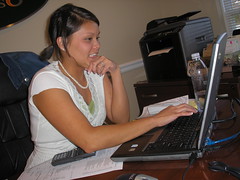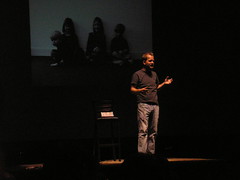The key concept to Studies of the Futures is that it is plural. Any work that is done in the field is about the potential futures and finding a way to best prepare for all of them. It’s not simply about knowing what the future is going to be; that is impossible. Instead, Studies of the Futures is about discovering what the future could be; what it most likely will be, what we’d want it to be, and – just to be complete – a few ideas of what kind of future could be created from unpredictable wildcard event.
The work of Studies of the Futures is much like the opposite of anthropologists. Futurists take the little things about the future we might be able to tell, whether from current trends and statistics or known current research that is happening, and expanding that out to a future that may be applicable to the future study we are partaking in. Just as anthropologists can then learn from the past, we seek to learn from the small gleam of the future we can understand. This is the reason for studying to futures; future to learn what actions to take today.
 Indeed, our house has been started!
We met with our (new) sales agent a week ago today and met our house's project manager for the first time. I must say, Fox Ridge has some great employees as they catered to our needs and somehow continued to laugh at my stupid jokes. The project manager definately seems to know his stuff and appears to be a hardworker (he was drenched with sweat when we got there).
We've been told that the average build time for a Fox Ridge home once it gets started is 80 days. However, because of the dry season we've been having, some of the houses in our neighborhood have been built in as few as 55 days! This means we can expect to be moving in between August 14th and September 8th. Excitement abounds.
Indeed, our house has been started!
We met with our (new) sales agent a week ago today and met our house's project manager for the first time. I must say, Fox Ridge has some great employees as they catered to our needs and somehow continued to laugh at my stupid jokes. The project manager definately seems to know his stuff and appears to be a hardworker (he was drenched with sweat when we got there).
We've been told that the average build time for a Fox Ridge home once it gets started is 80 days. However, because of the dry season we've been having, some of the houses in our neighborhood have been built in as few as 55 days! This means we can expect to be moving in between August 14th and September 8th. Excitement abounds.
 So right now, our house is a big pile of wood. It's kind of odd thinking how much that pile of wood is going to cost us. It's also amazing to think that it's going to transformed into a home we'll be living in, creating memories in, raising children in, eating with friends in, crying in, fighting in, breaking things in, and praying in.
Ashley and I are looking forward to building this house together and turning it into a home. In the meantime, we're moving to an apartment. But that's a whole other story...
So right now, our house is a big pile of wood. It's kind of odd thinking how much that pile of wood is going to cost us. It's also amazing to think that it's going to transformed into a home we'll be living in, creating memories in, raising children in, eating with friends in, crying in, fighting in, breaking things in, and praying in.
Ashley and I are looking forward to building this house together and turning it into a home. In the meantime, we're moving to an apartment. But that's a whole other story...This post will set the tone for the next two years of my life.
But first, I have to say how much I appreciate the team over at threadsmedia.com. They are doing a great ministry over there, trying to be honest about faith and life and trying to sort out what it means to be a Christian in today’s world. They’ve let me play in their sandbox as an almost “adjunct” team member going to (some) team meeting and posting my thoughts on the blog. I always want to add to the conversation and add to their ministry, never detract from it. And that’s why I’m OK with this:
A blog post of mine was recently taken down.
The official reason is that it was off-topic from the direction the blog has been heading. I’m ok with that. The post (which we’ll get to in a few lines) was definitely an experiment and, honestly, not my best work. It is more the kernel of an idea… the thoughts that I’m struggling with right now.
The intent of the blog at threadsmedia is to talk about our reactions to things that happen in life. My post was my reaction to something I read that really hit home with me and I thought would be a great way to open up a new conversation for the readership of threadsmedia to discuss.
Ironically, I did not put the post on this blog for two reasons:
1) I wanted to start diversifying my writing between what goes on here, threads, and my readingthebible blog.
2) The post was written with the threads audience in mind, introducing them to my struggles in life with a topic that most people who know me personally (i.e. the readership of this blog) probably already know.
Without further ado, the lost post of Aaron on threadsmedia.com:
*** May I talk about Robots? It was recently announced by Tennessee Congressman Zach Wamp and Pennsylvania Congressman Mike Doyle that, starting in September, there will be a congressional caucus to learn about robots. This… could be big. As robots get more and more pervasive in society, it’s important that we begin to try and figure out what the ethics and morals are for them. Eventually, their artificial intelligence will match/exceed our own. As robots move past being our vacuum cleaners or pets and become integrated into society, life as we know it will quickly change.So, now that the American government is waking up to the realization that there is something to discuss here, shouldn’t we as the church begin to sort out our thoughts? What happens to us, morally, if someone write some bit of code that gives robots true feelings? Are we morally obligated to them? What happens when some software is finally written that doesn’t need to be rebooted and can stay on forever, learning and thinking… do we have a right to take out its batteries? Are we to hold true to Asimov’s three laws… or does that essentially make these robots little more than slaves? I don’t have any kind of answer for any of this yet. But I want to explore it. Shouldn’t the church and all our visionaries begin to enter this conversation? Is this something that we need to be involved in, or do we trust that this is some subject the government can handle on it’s own? How do we as Christians begin to work through our morals and spirits to something so absent of life yet so full of potential? ***So… it’s not my best work nor is it a fully-realized document at all. To me, the ideas presented there are more like saying “hey, there’s a thing called an iceberg” moreso than studying what’s a mile or two deep into the iceberg… let alone 100 miles deep.
This conversation, however, is so far off the norm for typical spiritual conversation that it looks odd and out of place on the threadsmedia blog. Like I said – I’m not at all upset, wounded, or disappointed with the choice to take it down. I get it. I understand the reasons and fully support it. I’ll keep on writing for the blog and be honored and amazed that they even let me have a login.
My struggle is coming down the line, though. I’ll be seeking people to have these kinds of conversations with and I’m not sure where to have them. I’m genuinely concerned for the Church of America that is blind to what’s happening around us in regards to science, biology, culture and, well, the future.
And so, this August, I will begin working through the University of Houston’s Studies of the Future Master’s Program under the tutelage of Dr. Peter Bishop. I hope to join the conversation of contemporary futurists and help shape culture there. I hope there’s a place for me in the conversation of the Church to figure out how we are to react to changes in culture that are coming. I pray that I’ll still be loved an accepted by my Southern Baptist brethren as my words and ideas might be new.
I know that there are struggles coming for me. It’s going to be hard to walk the line between being informative and helping change lives with my studies and not sounding like an eccentric sci-fi author. Taking this new knowledge and translating it into some kind of text or study will have to be prompted by the Holy Spirit because I don’t know how to approach it.
I want to talk about synthetic life and what it means for Creation. I want to talk about gay bomb warfare and what it means for sexuality. I want to talk turning off DNA, installing auditory nerve implants and I want to talk about whether or not turning off robots is morally ok for a Christ-follower.
I’m excited to start the futurist program at UH as it will give me an opportunity to have these conversations and, just maybe, gleam some insight as to what it means for us spiritually. Maybe one day God will grant me some nugget of wisdom worth imparting so some listening audience, somewhere. And perhaps, just by chance, I might get to talk about robots.
One of my best friends, James, got engaged earlier tonight. I’m excited for him and his soon-to-be-bride and all the memories that life together will bring them. As a friend I get to share in their joy and be happy for them; they found the one they want to spend this life with. In that same breath, I remember being in college and James and I being jealous as our friends married off and found some woman to love on. We wanted so desperately to love and be loved. We wanted a “successful” relationship.
Now, just a couple years later and very happily married, I have learned a little something about relationships:
Every relationship can be a success. Every relationship should be a success.
As a young Christian growing up in youth group, I automatically assumed that every relationship was supposed to end in marriage. I would think that if I dated a girl and wasn’t thinking about a ring then I was wronging her and dishonoring myself. My perspective, and the goal or a relationship was wrong.
Every relationship can be a success; every relationship should be a success. I all depends on what you define as a success. My definition now?
Success in a relationship is determined by one little thing: Did I answer the question?
We befriend someone to answer the question: Should I date this person?
Now, that’s not to say the only reason we befriend someone is to figure out whether or not we should date them… instead, that before we decide “I want to date this person” we should at least befriend them. We should know some basics – do they have the same beliefs as me? Do we get along? Am I attracted to this person? Can I control myself around them? Do they let me be me?
If something happens here, if you aren’t compatible – it’s ok. We obviously shouldn’t be trying to date all of our friends – people perceive that as just being creepy and/or desperate. But look – if you decide that this person is not for you your time wasn’t wasted; it was a success! You answered the question and you are both wiser for it; and hopefully, you have a new, real friend.
If you do decide to date them… then you’re still successful! You answered the question. But after that success comes and even more important question…
We date to answer the question: Should I be in a relationship with this person?
So we’ve gotten the basics out of the way. You know you like each other, you get excited when they call and their sneezes sound cute. But now you’re asking something a little more serious. Being in a relationship is tying yourself to someone else. You begin to see them through rose-colored glasses. Because you want them to be right for you, because you want your time investment to be worthwhile, it’s easy to amplify the positive and pardon the real issues that are there. There are so many important things to still be discovered… do your friends like each other? Do your parents/mentors/guardians approve? Do your moral values line up? Is it comfortable to pray together?
If along the way you decide that no, I shouldn’t be in a relationship with this person that’s ok. It’s still successful because you answered the question. You were just dating, right? It wasn’t a commitment and hearts don’t have to be shattered. But if you answer the question and decide that yes – this is someone I want to be in a relationship with…
We are in a relationship to answer the question: Should I marry this person?
One of the most important decisions you will make in your life; is this the person I should marry? How do you even begin to decide this?
If you never had a clear answer on whether or not you should date this person, if you never had a clear answer on whether or not you should be in a relationship with this person… the ideas and thoughts in your heads are going to be so muddy that you won’t be able to answer this question clearly.
The relationship was a success if you answered the question “no” and ended the relationship. The problems come when the answer should have been “no” but you never decided the answer… or tricked yourself into thinking the answer was yes.
What makes you decide, “should I marry this person”? I think it’s different for everyone; you have to know what priorities are. If one of the pair has been called to international service work but the other doesn’t want to ever leave the country… there might be a problem there. If the girl has always dreamed of being a mom but the man can’t stand the idea of children… there might be a problem. Those are just surface issues.
Perhaps even better are the opposite questions: why should I marry this person? Can we do ministry together? Does he make you smile in the morning? Do your friends see the love you two share? Does she make you want to be a better man?
And if the answer is no; if you decide somewhere that you shouldn’t be married to this person… then the relationship is still a success. Why? Because you answered the question. Yes, it will hurt and your heart will be broken. But you answered the question and – ultimately – you can look back on the relationship as a success.
The goal isn’t to be married; the goal is to discover who you should be married to. Once you find that, the rest is easy.
Congratulations, James and Heather. I’m glad that each step along the way you answered the question. I’m honored that I got to pray with you and can’t wait for you two to discover all the joys, struggles, smiles and tears that marriage will bring. I’m excited that you discovered who you should be married to; I’m glad you had the courage to ask and I’m she already knew she’d said yes.



19 Will You ever look away from me,
or leave me alone until I swallow my saliva?
20 [If] I have sinned, what have I done to You,
Watcher of mankind?
Why have You made me Your target,
so that I have become a burden to You?
21 Why not forgive my sin
and pardon my transgression?
For soon I will lie down in the grave.
You will eagerly seek me, but I will be gone.
Job 7:19-21 (HCSB) You will eagerly seek me, but I will be gone. So God, instead, just love on me? Please stop being so powerful and distant and terrifying... and just love on me. Job... I love your uncensored emotion and heart. Oh, come on! That's beautiful. Amazing. Job is so passionately trying to get his head around the idea of God. Job is trying to figure out this whole sin and forgiveness thing. He's begging God to just give a little grace...32 For He is not a man like me, that I can answer Him,
that we can take each other to court.
33 There is no one to judge between us,
to lay his hand on both of us.
34 Let Him take His rod away from me
so His terror will no longer frighten me.
35 Then I would speak and not fear Him.
But that is not the case; I am on my own.
Job 9:32-35 (HCSB) If that's not a man begging for the Messiah, I don't know what is. I can't imagine living in a time when one didn't know how God was going to redeem His people. I can't imagine being lost, trying to figure out why the world is set up this way, with failable humans, an infailable God, and sin and punishment and forgiveness and grace being all scattered about. That might be one of my new favorite sets of verses. One more from tonight:Only grant [these] two things to me, [God] ,
so that I will not have to hide from Your presence:
21 remove Your hand from me,
and do not let Your terror frighten me.
22 Then call, and I will answer,
or I will speak, and You can respond to me.
23 How many iniquities and sins have I committed?
Reveal to me my transgression and sin.
24 Why do You hide Your face
and consider me Your enemy?
Job 13:20-24 (HCSB)originally published on threadsmedia.com
Today I checked our bank account and saw that we have a whopping $150 to last us until our next paycheck. It was startling because it’s the first time our finances have been that low since we’ve been married. We’re in no danger, we get paid in a few days and our bills are paid up… but it was startling.
I think it’s a healthy thing to know for a little bit what living on a tight budget is like again. It wasn’t really that long ago when I was college… $150 would have been like a gold mine that could stretch out across a whole semester. It’s amazing how quickly our perspectives on money can change.
$150 seems so limiting right now – it means we can’t go out and have a nice meal. It means that I can’t buy a new video game. It means that one of our cars isn’t going to get used for a few days (it needs a new battery). Even though it feels so limiting, we have so much stuff. We have a roof over our heads, groceries to cook, and DVDs to watch.
It alarms me that $150 can be so startling to me. We’ve had people in our church who struggle for rent and groceries every week. In the past I’ve spent $150 on a whim for gifts, for toys, for something selfish.
It seems strange what seeing $150 in your bank account can make you think. When I first saw, I thought “oi – we’re poor.” But we’re not poor. We don’t have a right to claim being poor at all. We have no idea what it really means to be poor.
I almost struggle with knowing what poor means. If we only had $150 and no paycheck coming next month… then maybe I’d have a sense of being poor. I have hope, though, because I know that money is coming. I don’t know what it feels like to not know when the next time we’ll have money is. College was only a few years ago… and yet have we been so “successful” that we’ve forgotten what it’s like to be struggling for money, having friends pay for dinner and being content with just what we already have?
I’ll be honest – I don’t want to be poor. I don’t want to not know when the next paycheck comes. I do, however, want to hold on to that moment when I saw $150 in my bank account. I want to remember how startled I was and concerned I was at that moment. And then – to know that what I think is a cause for alarm is riches to other people.
So how do I hold on to that memory? How do I begin to relate to someone who is homeless? How do I gauge what wealth is to me against what wealth is to a friend? How can I complain when I think I have little, but truly have too much?

Chris Seay’s talk was on consumerism. I’ve heard his name spoken around here and there; I know my pastor is a big fan. I’m not sure about why he was chosen as the expert on consumerism… not against it but just not sure why. His talk was much more pastoral than the others; it was needed as it was a much more familiar style of talk.
Seay started out by talking about how commercials have been telling us a counterfeit story. This flowed really well out of Donald Miller’s talk. Seay stated that the counterfeit story we’ve been told is that “when we get what we want we will be happy” – and it is this lie that diverts our attention to consumerism.
Seay used the interesting analogy of how, when playing Sims, buying things make your Sim’s comfort level go up. We’re being trained that buying things simply for the sake of buying things is going to make us feel better. That we’re trained to want more.
Seay sees that in the history of scripture, Israel is always asking for more. There is always this human need to want more. Now, in America, the richest people in history are obsessing over what we don’t have.
In response to all this, Seay lets out the major point here: We were made to create, not just consume.
Some interesting stats he laid on us:
Americans spend:
$18 Billion on makeup
$15 Billion on perfume
$17 Billion on pet food
It would cost:
$5 Billion to eliminate illiteracy worldwide
$10 Billion to solve the water crisis for everyone in the world
$19 Billion to eliminate hunger worldwide
Seay also charged us to not spend so much on material gifts for Christmas, but instead use that money (Q attendees together spend an estimated $344,000 on gifts in 2006) to help change the world.
For me, this talk reminded me of one my ongoing threads of thought as of late: the role of the church in America is to be the pocketbook of the global church. Our money is worth such an average amount here to by above-average material items. Even a small portion of our money redirected to another country can literally save lives every day.
It’s hard because we have been so uneducated and inexperienced. Even at church we talk about all the new gadgets and gizmos and ways we can stay connected to build community… but don’t think to build community by changing lives across the world by giving $5 here and there. America doesn’t help us either, as – just as Seay said – the story has been made into a counterfeit consumerist one. We don’t get the news or see the images of our human brothers and sisters struggling while we try to decide what temperature to set the room we’re in.
Seay’s talk was a tough one because I feel like I should be moved to do something great and give away more than I already am. But we’re stuck in debt and can’t seem to do much until we get out of that. There are things I can sell and clear out my “space”… but are we called to have little? Or are we called to have wisely?
While I’ve been reading through the Old Testament I found that having things isn’t bad… it’s an honorable thing. I think the important thing is that we can “have” – but that we shouldn’t have in such excess that the people around us have so dramatically less. It’s ok to have a large house… but have people living with you. It’s ok to have toys… but make sure that the kids you know (and some you don’t know) have toys too.
Is that being too easy on myself? Should we live in poverty for the sake of poverty? It’s tough, strange line. Probably will be something we’ll all be dealing with as we live in America and spend on one meal the amount that could feed a child else where for a month. It’s probably something we’ll always be thinking and processing through.
And maybe that’s a good thing.
Miriam’s drum is pounding the pavement
At a rate of 60 beats per minute.
Another musical soul has come with the hope
That here her dreams will take root.
She steps onto the street and off the bus -
A phone number in hand and a pick in her purse
She thinks that this first day
Will inspire her first verse.
Miriam’s drum is pounding the pavement
At a rate of 70 beats per minute.
musician’s soul is filled with hope –
Some producer liked her style.
She won’t have to sell her wares on the street
Playing for a dollar and some loose change.
She might have to sing someone else’s song
But at least they’ll be in her vocal range.
It’s a small price to pay –
Giving up one’s words and voice –
To reach an audience of a hundred
And open for some new business friend.
This is her first step to musical success
This is her first step to her hope’s end.
Miriam’s drum is pounding the pavement
At a rate of 80 beats per minute.
It’s not just about her voice, she finds out
And everyone here can play guitar.
The producer chastises her like a child:
It’s about her hips and dips and curves
She has to wear better-than-Target clothes.
And her name is no longer hers.
She’s already had seven different members
Of her three piece county band.
One moved on to Memphis,
Another just disappeared.
The other two? They were more successful than her
Just like she always feared.
Our musician’s heart is pounding in her chest
At the rate of 90 beats per minute.
This is her last chance, she thinks,
To make a lasting impression.
Her pulse is going so fast
That she has lost her health and remains unfocused
She’s in a mix of depression and aggression
All she really wanted was the attention of us.
She thinks the producer is reaching
For the guitar that is laid in her lap.
So she cringes as he touches her leg instead.
She thought that she came here to share in art
Not expose her body, sell a product,
And silence the music in her heart.
Miriam’s drum is not pounding the pavement.
There are no beats in this minute.
Our musical soul has picked her foot up
Off the streets of and onto a one-way bus.
She has packed up her dreams and her life.
Maybe in some other town she could have been a star
A writer, singing her own songs
But Nashville has stolen her acoustic guitar.
Miriam’s drum is pounding the pavement
At a rate of 60 beats per minute…




